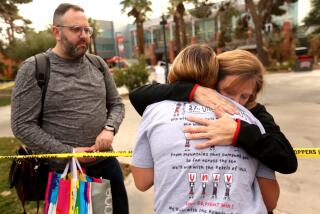Colorado shooting: D.A. to see alleged gunman’s school records
CENTENNIAL, Colo. — A judge in the case against James E. Holmes ruled Wednesday that most of the mass murder suspect’s academic records, his campus police file and some communication with University of Colorado Denver professors can be given to the prosecution to show state of mind and possible motive.
Holmes, 24, was considered a promising doctoral student in the university’s elite neuroscience graduate program before he withdrew about six weeks before the July 20 Aurora theater massacre. Twelve people died and at least 58 were wounded when Holmes allegedly opened fire in a packed movie theater during a post-midnight premiere of “The Dark Knight Rises.” He faces 166 charges, including two first-degree murder charges for each person killed.
Holmes’ waning days at the university have been a key legal issue from the beginning of the case. Prosecutors subpoenaed Holmes’ school records, including his admission application, as well as email communication with professors concerning his academic performance.
Prosecutors have crafted a scenario that Holmes’ life was unraveling in the months before the shooting. They said Holmes told a classmate in March that he wanted to kill people, that he had failed a key oral exam on June 7, and that he had threatened a professor around the time he was withdrawing from school.
Psychiatrist Dr. Lynne Fenton testified in August that she was so alarmed after her one and only therapy session with Holmes on June 11 that she called campus police, but she did not specify at the hearing what she had reported.
The defense, which has said Holmes is mentally ill, wanted to block the admission of the University of Colorado records, calling them irrelevant and accusing the prosecution of conducting a fishing expedition.
Chief Judge William Sylvester of the 18th Judicial District, in his ruling Wednesday, mostly agreed with the prosecution and wrote that the university records could give a glimpse into Holmes’ life from the time he laid out his academic ambitions in his application to the circumstances surrounding his decision to withdraw from the program.
“Intent will be a key issue at trial,” Sylvester wrote in his ruling, adding that “documents that establish Defendant’s expectations when applying to the University of Colorado could possibly make more or less probable the fact that defendant had a motive to commit the crimes charged.”
Sylvester said communication with professors as Holmes was withdrawing was similarly relevant as it might shed light on his state of mind. In addition, the judge ruled that all campus police records about Holmes should be given to the prosecution, with the exception of anything that might be considered privileged information from Fenton.
All of the documents to be given to the prosecution remain sealed from the public.
The judge denied the prosecution request for class schedules, saying they were irrelevant to the case. He also blocked the release of unspecified voicemail messages, presumably because those would also fall under doctor-patient privilege.
ALSO:
Jessica Ridgeway memorial draws thousands
4.0 earthquake centered in Maine rattles New England
George Zimmerman trial date set -- but will it really happen?
More to Read
Sign up for Essential California
The most important California stories and recommendations in your inbox every morning.
You may occasionally receive promotional content from the Los Angeles Times.










